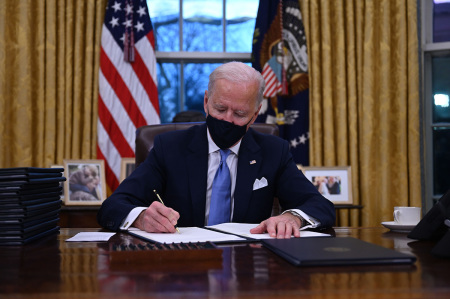Biden reestablishes White House Office of Faith-Based & Neighborhood Partnerships

President Joe Biden issued an executive order Sunday reestablishing the White House Office of Faith-Based and Neighborhood Partnerships, following in the tradition of previous administrations.
Biden signed the order with the stated objective of seeking to “better serve people in need through partnerships with civil society while preserving our fundamental constitutional commitments.”
“The American people are key drivers of fundamental change in our country, and few institutions are closer to the people than our faith-based and other community organizations,” reads the order.
“It is important that the Federal Government strengthen the ability of such organizations and other nonprofit providers in our communities to deliver services effectively in partnership with Federal, State, and local governments and with other private organizations ...”
A stated goal of the faith-based office is “to assist in organizing more effective efforts to serve people in need across the country and around the world.” Additionally, the office seeks “to bring concerns, ideas, and policy options to Administration leadership for assisting, strengthening, and replicating partnerships, whether financial or nonfinancial, with faith-based and other community organizations.”
“From COVID-19 to the economic crisis, we’re facing enormous challenges — and faith-based and community organizations are essential to addressing them,” Biden, a Catholic, tweeted Sunday. “That’s why today, I reestablished the White House Office of Faith-Based and Neighborhood Partnerships. Let’s get to work.”
According to a fact sheet released by the White House, the office’s executive director is Melissa Rogers, who previously served in a similar capacity during the Obama administration from 2013 to 2017.
Josh Dickson, an evangelical Christian and White House senior advisor for public engagement, will serve as the office’s deputy director.
In an interview with The Christian Post last summer, Dickson explained that then-Democratic nominee Biden was “developing relationships” with faith communities, including evangelicals.
“I know that not everyone is going to agree with him on everything. We're a big tent party as Democrats. Joe Biden is someone who is putting forward a vision that is inclusive,” said Dickson at the time.
“We want to let people of faith know that in this moment that they are valued and they matter to the vice president and to this campaign and to the future direction of this country.”
President George W. Bush is credited with creating the first White House Office of Faith-Based and Community Initiatives in 2001. The Obama administration began its version of the office in 2009.
In 2018, President Donald Trump created the White House's Faith and Opportunity Initiative, an office led by Trump’s spiritual advisor Paula White. Unlike past administrations, the office did not operate within the Domestic Policy Council.
Selecting Rogers to lead the reestablished office drew praise from Josh Good, the director of the Ethics & Public Policy Center’s Faith Angle Forum.
“Looks like smart staffing for the new White House Office of Faith-Based and Neighborhood Partnerships, whose roots go back two decades,” he tweeted.
Not everyone was happy with Biden’s order.
The Freedom From Religion Foundation, which advocates for strict separation of church and state, called on Biden to “abolish” the office instead of resurrecting it.
The organization’s lawsuit against Bush’s version of the office went to the Supreme Court. In 2007, the Supreme Court narrowly ruled that the group had no right to sue the federal government over programs funded by appropriations for general administrative expenses.





















